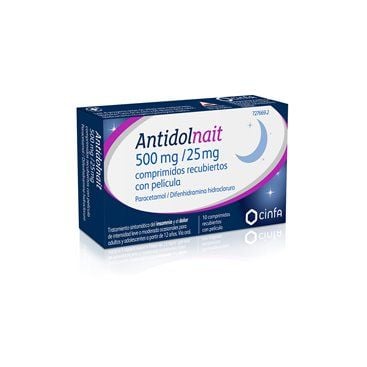Antidolnait 500Mg/25Mg 10 Film-coated Tablets
Antidolnait is a combination of paracetamol and diphenhydramine hydrochloride. It is used in the symptomatic treatment of insomnia and occasional mild or moderate pain intensity for adults and adolescents from 12 years of age.
Antidolnait is a combination of paracetamol and diphenhydramine hydrochloride. It is used in the symptomatic treatment of insomnia and occasional mild or moderate pain intensity for adults and adolescents from 12 years of age.
Antidolnait 500 mg / 25 mg film-coated tablets
Paracetamol / Diphenhydramine hydrochloride
Read all of this leaflet carefully before you start taking this medicine, because it contains important information for you.
Follow exactly the instructions for administration of the medicine contained in this leaflet or those indicated by your doctor or pharmacist.
- Keep this leaflet. You may need to read it again.
- If you need advice or more information, ask your pharmacist.
- If you experience side effects, consult your doctor or pharmacist, even if they are side effects that are not listed in this leaflet. See section 4.
- You must see a doctor if you do not feel better or if you feel worse after 5 days.
Package leaflet content
- What Antidolnait is and what it is used for
- What you need to know before you take Antidolnait
- How to take Antidolnait
- Possible side effects
- How to store Antidolnait
- Package contents and additional information
1. What is Antidolnait and what is it used for
Antidolnait is a combination of paracetamol and diphenhydramine hydrochloride. Paracetamol belongs to a group of medicines called painkillers, diphenhydramine belongs to a group of medicines called antihistamines, which have sedative properties.
It is used in the symptomatic treatment of insomnia and occasional mild or moderate pain intensity for adults and adolescents from 12 years of age.
You must see a doctor if you do not feel better or if you feel worse after 5 days.
2. What you need to know before you take Antidolnait
Do not take Antidolnait:
- If you are allergic to paracetamol, diphenhydramine hydrochloride, or any of the other ingredients of this medicine (listed in section 6).
- If you have taken any other medication containing paracetamol in the last 4 hours.
- Together with other medications that contain antihistamines.
- If you suffer from porphyria (an excess of porphyrin can cause a reddish color in the urine).
Warnings and cautions
Consult your doctor or pharmacist before taking Antidolnait.
You should not take more than the recommended dose in section 3 of this leaflet "How to take Antidolnait".
You should consult a doctor before taking this medicine if you suffer from:
- Impaired liver and / or kidney function (including impaired liver due to chronic alcohol use).
- Chronic malnutrition or dehydration.
- Epilepsy or seizures.
- Obstruction or narrowing in the stomach or intestine (for example, as a result of an ulcer).
- Difficulty urinating.
- Angle closure glaucoma (elevated intraocular pressure).
- Abnormal enlargement of the prostate.
- Myasthenia gravis.
- Asthma, bronchitis (inflammation of the bronchial tubes), or chronic obstructive pulmonary disease (COPD).
- Some heart disease or anemia (decrease in the level of hemoglobin in the blood, whether or not due to a decrease in red blood cells).
- In asthmatic patients sensitive to acetylsalicylic acid, the doctor should be consulted before taking this medicine.
This medicine is not recommended if you have previously had a hypersensitivity reaction caused by another antihistamine commonly used to treat nausea, certain dizziness, allergies, or colds.
If the pain persists for more than 5 days, or worsens or other symptoms appear, you should consult your doctor.
Prolonged or frequent use of this medicine is not recommended except under medical supervision, you should not take this medicine for longer than necessary to control your symptoms.
Children and adolescents
- Do not administer to children under 12 years of age.
- It will only be administered to adolescents (under 18 years of age) on the recommendation of the doctor.
Taking Antidolnait with other medicines
The use of other medicines containing paracetamol (the simultaneous use of more than one medicine containing paracetamol can lead to pictures of liver poisoning), or antihistamines and other medicines with sedative effect should be avoided.
Tell your doctor or pharmacist if you are taking, have recently taken or might take any other medicines.
In particular, if you are using some of the following medicines, as it may be necessary to modify the dose of some of them or to interrupt the treatment:
- Tranquilizer or anxiety medicines (diazepam, lorazepam).
- Opioid pain relievers (codeine, tramadol, fentanyl, morphine).
- Medicines that make you drowsy or dry your mouth.
- Medicine to prevent blood clots: oral anticoagulants (acenocoumarol, warfarin).
- Medicines to treat epilepsy (lamotrigine, phenytoin or other hydantoins, phenobarbital, methylphenobarbital, primidone, carbamazepine).
- Medicines to treat tuberculosis (isoniazid, rifampicin).
- Diuretic drugs (furosemide, torasemide).
- Medicines to treat gout (probenecid).
- Medicine to treat high blood pressure and heart arrhythmias (propranolol).
- Medications for depression: tricyclic antidepressants (amitriptyline, imipramine, nortriptyline).
- Monoamine oxidase inhibitors (MAOI) in the last 2 weeks (phenelzine, iproniazide, moclobemide).
- Atropine.
- Medicines used to prevent nausea and vomiting (metoclopramide and domperidone).
- Medicines to lower blood cholesterol levels (cholestyramine).
- Medicines for travel sickness.
Interference with analytical tests
If you are going to do a diagnostic test (including blood or urine tests) tell the doctor that you are taking this medicine, as it can alter the results.
Taking Antidolnait with food, drink and alcohol
While you are being treated with this medicine, you should not drink alcoholic beverages because it can enhance the adverse effects of this medicine, especially on the liver and nervous system.
Pregnancy, lactation and fertility
If you are pregnant or breast-feeding, think you might be pregnant or are planning to become pregnant, consult your doctor or pharmacist before using this medicine. The use of medications during pregnancy can be dangerous for the embryo or fetus and should be monitored by your doctor.
Pregnancy
Do not administer during pregnancy, especially during the first and last trimesters, unless, according to medical criteria, the benefits justify the possible risks.
Lactation
Because the active ingredients of the drug pass into breast milk, its use is not recommended during breastfeeding.
Driving and using machines
Do not drive or use tools or machines during treatment with Antidolnait because this medicine makes you drowsy.
3. How to take Antidolnait
Follow exactly the instructions for administration of the medicine contained in this leaflet or those indicated by your doctor or pharmacist. If in doubt, ask your doctor or pharmacist.
This medicine is administered orally.
The recommended dose is :
Adults : 1 or 2 tablets taken with water, 20 minutes before bedtime. Do not take more than 2 tablets in 24 hours.
You should not exceed 3 grams of paracetamol in 24 hours without consulting the doctor and at least 4 hours must have elapsed since the previous taking of another analgesic medicine that contains paracetamol. Keep this in mind before taking Antidolnait.
Adolescents 12 to 18 years : The recommended dose in adolescents is 1 tablet taken with water, 20 minutes before bedtime under medical advice.
Do not take more than the recommended daily dose.
This medicine should not be administered for more than 5 consecutive nights without consulting a doctor.
The patients with impaired liver or kidney disease should consult a doctor and reduce the dose of the drug.
Use in children and adolescents
- Do not administer to children under 12 years of age.
If you take more Antidolnait than you should
Overdose symptoms may be: dizziness, vomiting, loss of appetite, yellowing of the skin and eyes (jaundice), and abdominal pain.
If you have ingested an overdose, you should go immediately to a medical center even if you do not notice the symptoms, since these often do not appear until 3 days after the ingestion of the overdose, even in cases of severe poisoning.
Treatment of overdose is most effective if it is started within 4 hours of ingestion of the medicine.
Patients taking barbiturates or chronic alcoholics may be more susceptible to toxicity from a paracetamol overdose.
Due to diphenhydramine, other symptoms such as mydriasis (dilation of the pupil of the eye), fever, flushing (reddening of the skin), agitation, tremor, involuntary muscle contractions, hallucinations, seizures, and changes in activity may also occur. electrical heart. After large doses, muscle reactions may also occur with damage to muscle cells, seizures, delirium (very severe confusion), altered thoughts (psychosis), irregular heartbeat, coma and collapse.
In case of overdose or accidental ingestion, immediately consult your doctor or pharmacist or call the Toxicological Information Service, telephone 91 562 04 20, indicating the medicine and the amount ingested. You should consult immediately even if you feel fine, due to the delayed risk of serious liver damage that paracetamol can cause.
If you forget to take Antidolnait
Do not take a double dose to make up for a forgotten dose. Take your dose at the normal time the next day.
If you stop taking Antidolnait
If you have any further questions on the use of this medicine, ask your doctor or pharmacist.
4. Possible side effects
Like all medicines, this medicine can cause side effects, although not everyone gets them.
People over 65 years of age are at greater risk of adverse reactions, as they may suffer from other diseases or may be taking other medications simultaneously. These people are also at increased risk of falling. The incidence of adverse effects is lower in short treatments and if the daily dose is below the maximum recommended dose.
The following side effects have been observed for paracetamol :
Side effects of unknown frequency (cannot be estimated from the available data): blood problems such as decreased blood platelets (thrombocytopenia) or agranulocytosis, allergic (hypersensitivity) reactions ranging from a skin rash to a hypersensitivity reaction severe generalized where swelling of the face and / or tongue (angioedema), anaphylaxis, respiratory distress (bronchospasm) may appear and which are more likely if they have been previously experienced after taking other painkillers (such as ibuprofen and aspirin).
Serious skin reactions such as Steven-Johnson syndrome / toxic epidermal necrolysis.
Paracetamol can damage the liver when taken in high doses or in long-term treatments.
The following side effects have been observed for diphenhydramine :
Common side effects (may affect up to 1 in 10 people): fatigue, drowsiness, sedation, dizziness, unsteadiness, difficulty concentrating, and dry mouth.
Side effects of unknown frequency (cannot be estimated from the available data): blurred vision, changes in heart rhythm (tachycardia), uncomfortable feeling when aware of your own heartbeat (palpitations), increased viscosity of sputum (increased bronchial secretion ), stomach discomfort including nausea and vomiting, small involuntary muscle contractions (muscle twitching), difficulty urinating (dysuria), urinary retention, seizures, headache, abnormal uncontrolled movements of the limbs (dyskinesia), strange sensation on the skin such as burning, stinging, tingling or tingling (paraesthesia), allergic reactions (hypersensitivity) ranging from a simple skin rash (redness or swelling of the skin) or hives (hives) and,in the case of a severe generalized hypersensitivity reaction, swelling of the face and / or tongue (angioedema) and shortness of breath (dyspnea) may appear.
Søs Carine W. published the 05/04/2024 following an order made on 26/03/2024
Sólo puedo dar mis mejores recomendaciones. Vivo en Dinamarca y cuando hago el pedido, tarda un máximo de 5 días y luego DHL lo entrega. Pido pastillas para dormir y analgésicos, ya que no se consiguen en Dinamarca y me ayudan mucho.




